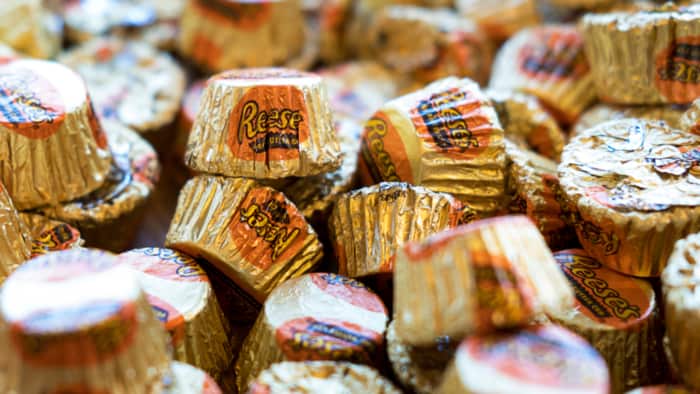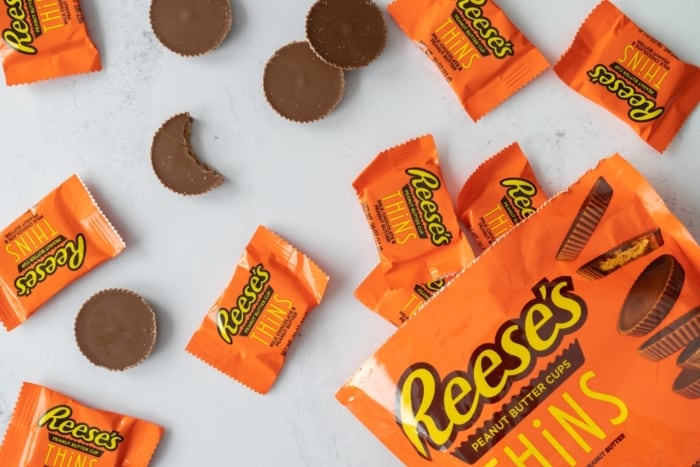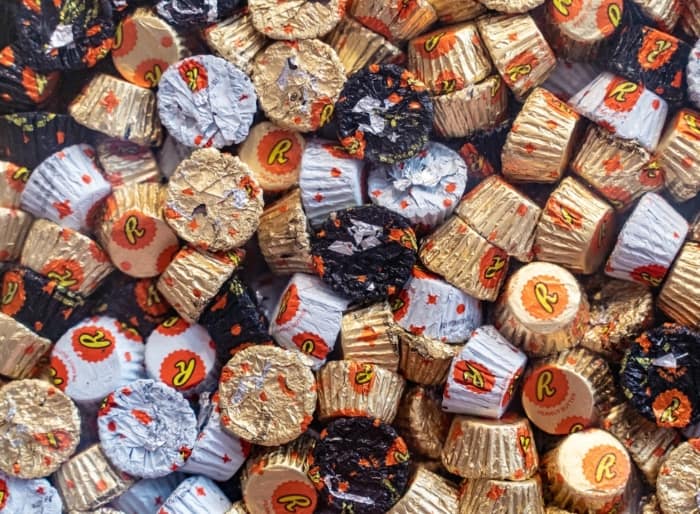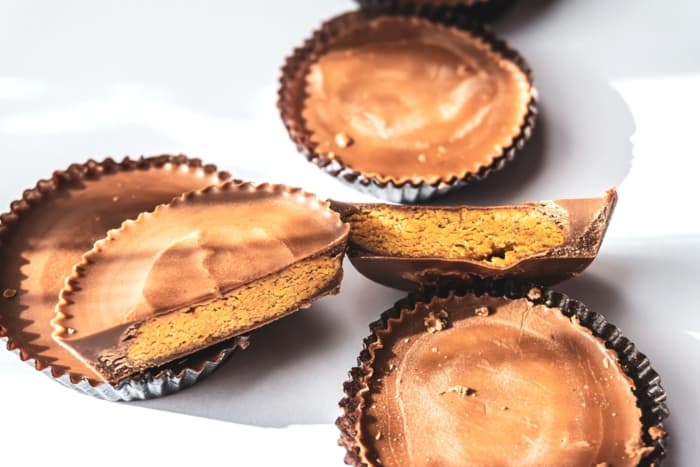Are Reese’s Gluten Free?
When it comes to desserts, birthdays, holidays, and Halloween, you may wonder: are Reese’s gluten free? Reese’s Peanut Butter Cups are a popular American candy enjoyed by people of all ages. It is important to know whether or not Reese’s Peanut Butter Cups are safe to consume. Try these Homemade Peanut Butter Cups which are gluten free and vegan.

All varieties of Reese’s Peanut Butter Cups are gluten free, except for seasonal items, such as Reese’s Peanut Butter Eggs. The ingredient list for Reese’s Peanut Butter Cups does not contain any gluten containing ingredients. In addition, Hershey’s, the manufacturer of Reese’s, states that all Reese’s Peanut Butter Cups are gluten free.
However, it is important to note that Reese’s Peanut Butter Cups are not certified gluten free. They have not been tested by a third-party organization to ensure that they meet the FDA’s definition of gluten free. The definition of gluten free means less than 20 parts per million of gluten.
For this reason, people with celiac disease or non-celiac gluten sensitivity may want to avoid Reese’s Peanut Butter Cups. Even though they are gluten free according to the ingredient label, there is always a risk of cross-contamination during manufacturing.
Curious about rice krispie treats? Learn more about Rice Krispies and if they are gluten free or not.
Which Reese’s Are Gluten Free?
Reese’s offers a range of products, and the gluten free status may vary among them. Here is a breakdown of some Reese’s products and their gluten free status:
Reese’s Peanut Butter Cups (Regular and Miniatures)
These classic peanut butter cups are typically considered gluten free. However, they come with a disclaimer on the packaging that they “may contain traces of gluten”. This is due to the potential for cross-contamination during manufacturing. For most people with mild gluten sensitivity, this level of cross-contamination is not a significant concern. However, those with Celiac disease or extreme gluten sensitivity should exercise caution.
Reese’s Pieces
Reese’s Pieces, the peanut butter-filled candy shells, are generally considered gluten free. Again, they may have a cross-contamination disclaimer.
Reese’s Peanut Butter Cups (White Chocolate and Dark Chocolate Varieties)
These variations of the classic peanut butter cups are typically considered gluten free but may come with cross-contamination disclaimers.

Reese’s Fast Break
This candy bar contains wheat flour in its nougat layer and is not gluten free. Individuals with gluten sensitivity or celiac disease should avoid it.
Reese’s NutRageous
This candy bar contains wheat flour in its nougat layer and is not gluten free. It should also be avoided by those with gluten related dietary restrictions.
Reese’s Outrageous! Bar
While the peanut butter, caramel, and milk chocolate in this bar are gluten free, it also contains pretzels. Pretzels are made from wheat flour and contain gluten. Therefore, this product is not gluten free.
Are Reese’s Celiac-Friendly?
Whether Reese’s products are considered “Celiac friendly” depends on the severity of your Celiac disease and tolerance for cross-contamination. Here is what you need to know.
Ingredients: Most Reese’s products, including the classic Reese’s Peanut Butter Cups and Reese’s Pieces, do not contain gluten containing ingredients. Some Reese’s products may contain ingredients like pretzels or wheat flour in nougat layers as in the case of certain candy bars. These should be avoided by individuals with Celiac disease.
Cross-Contamination: The primary concern for individuals with celiac disease is the risk of cross-contamination. While Reese’s Peanut Butter Cups are typically considered gluten free, the manufacturer, Hershey’s, often includes a disclaimer on their products that they “may contain traces of gluten”. This is due to shared equipment or processing lines.
Severity of Celiac Disease: For individuals with mild gluten sensitivity, the level of cross-contamination in Reese’s products may not pose a significant risk. However, if you have celiac disease or severe gluten sensitivity, even tiny traces of gluten can trigger adverse reactions. Therefore, exercise caution and potentially avoid products with cross-contamination disclaimers.
Communication with the Manufacturer: If you have Celiac disease, contact the manufacturer (Hershey’s) directly to inquire about their gluten free practices. This includes testing and the measures they take to prevent cross-contamination. Manufacturers’ policies and procedures can change over time, so it’s essential to get the most up-to-date information.
Gluten Free Varieties: Some Reese’s products, like the regular Reese’s Peanut Butter Cups, may offer specially labeled “gluten free” varieties that are manufactured with additional precautions to minimize the risk of cross-contamination. Look for these specially labeled products if you want to reduce the risk further.

Why Are Seasonal Reese’s Not Gluten Free?
Seasonal Reese’s products, such as those released for holidays like Halloween or Christmas, are sometimes not labeled as gluten free due to several reasons.
Manufacturing Practices: Seasonal Reese’s products are often produced on shared equipment or production lines that also process other seasonal candies and snacks that contain gluten containing ingredients. This shared equipment increases the risk of cross-contamination.
Ingredients: Some seasonal Reese’s products may contain different ingredients or variations compared to their regular counterparts. These ingredients could include additives, fillings, or decorations that introduce gluten or cross-contamination.
Labeling Regulations: Food labeling regulations can vary by country and region. In some cases, manufacturers may choose not to label seasonal products as gluten free if they cannot guarantee the product meets the criteria for gluten free certification.
Safety Concerns: Companies take the safety of consumers with dietary restrictions seriously. To avoid potential health risks and legal liabilities, they may choose not to label products as gluten free if they cannot meet stringent standards or prevent cross-contamination.
It’s important to note that not all seasonal Reese’s products are necessarily unsafe for individuals with gluten sensitivity or celiac disease. The decision not to label them as gluten free is often a precautionary measure.
Frequently Asked Questions (FAQs)
Yes, Reese’s Cups are generally considered gluten free, but it may contain traces of gluten due to cross-contamination.
Hershey’s gluten free candies include Reese’s Peanut Butter Cups, Hershey’s Kisses (most varieties), and Jolly Rancher hard candies.
No, Snickers are not gluten free due to wheat-based ingredients in their nougat.
Most plain M&M’s are considered gluten free, but always check the label for any variations or cross-contamination risks.
While most Reese’s are made without gluten, they process the products on equipment that processes wheat. Due to cross contamination, Reese’s are not safe for Celiacs.

Try these other gluten free chocolate peanut butter desserts! I love these Chocolate Peanut Butter Brownies and Chocolate Peanut Butter Pie.
You May Also Like
- Chocolate Peanut Butter Pie
- Peanut Butter Cheesecake
- Healthy Peanut Butter Balls
- Peanut Butter Energy Balls
- Peanut Butter Chocolate Chip Cookies
If you found this post helpful, I would really appreciate a review! You can find me on Instagram, Facebook, and Pinterest. Join my exclusive Facebook Group for a behind the scenes look. I would love for you to follow along! For more ideas, check out these Dessert Recipes.

